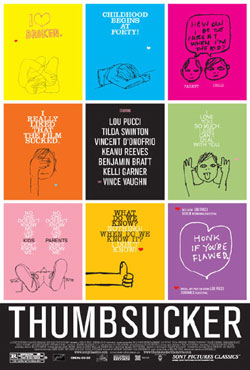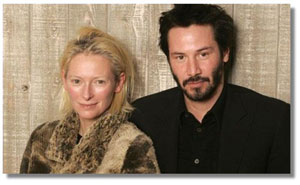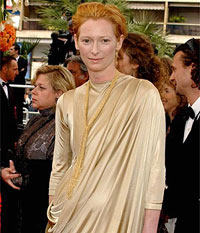 Casting Tilda Swinton as an angel in Constantine was obviously a great idea, but it wasn’t until I saw her in person that I really understood how perfect it was. The person she most reminded me of was a younger David Bowie, and while I rarely find androgyny to be very sexy, she really makes it work.
Casting Tilda Swinton as an angel in Constantine was obviously a great idea, but it wasn’t until I saw her in person that I really understood how perfect it was. The person she most reminded me of was a younger David Bowie, and while I rarely find androgyny to be very sexy, she really makes it work.
In her new film, Thumbsucker, she’s not playing sexy (although no amount of frumpiness in the world holds her back), she’s playing the mom to Lou Pucci’s thumbsucking teen Justin. Before Tilda came in, we had spoken to the director Mike Mills (not the one you’re thinking of), who had told us of the film’s long journey to the screen. Look for him later in the week, where you can read how he told us that Tilda was the actor who stuck around with his little film the longest, and how she became a producer on the project. Of course that meant we would start the interview with that.
Tilda’s been someone I’ve enoyed for years, but she’s about to get huge. This Christmas she’s playing the villainous White Witch in Disney’s mega-budget The Chronicles of Narnia: The Lion, the Witch and the Wardrobe, and you’re going to see her all over the place promoting it. Enjoy her here now, in this fairly in-depth interview, in the calm before the storm.
Thumbsucker opens in limited release on Friday.
Q: Mike Mills said that you were the one who hung in there the longest in the long process of getting this film made. What made you want to hang on so long?
Swinton: Mike Mills. You’ve met him and so you understand why. So that’s it. And I knew about him anyway. I knew that I might feel this way about him and I did. On it goes. It was going to happen. It was obviously going to happen and it was obvious that it was going to be as good as it is. It was obvious to me. I have to say that it’s been obvious to me before now with other first time filmmakers that I’ve had the privilege to work with who’ve had people telling them they’re insane when they went to ask for money. I get a real kick out of it, this thing of going, ‘I was right. I was right.’
Q: You’re now a mother, right?
Swinton: I am a mother.
 Q: Did that help you relate to your character?
Q: Did that help you relate to your character?
Swinton: No. It’s very different. I relate to Justin entirely. Justin is my into it. I don’t, as a mother, relate for two reasons. First of all, I’m not there yet. I don’t have seventeen year olds and also I think that I’m well aware of the fact that I don’t know what I’m doing. Whereas she is fighting that. So I think that I’m in a better position or just that I have clearer sense of chaos then she does. Also, she had them very young and I had my children so old. Also, I have the great luxury of being able to live several different lives at once. Whereas she is in that quite orthodox position of becoming a mother and putting aside her solitary, identifiable self as Audrey the person and has to look after their worlds. That kind of thing really kicks you in the ass I think eventually. One sees it time and time again. Obviously everyone does it to a certain extent. Parents are really led up that path, but for mothers I think that it’s really, really hard to resist being consumed by one’s mother identity and keeping in touch with one’s individual self.
Q: Can you talk about your role as producer?
Swinton: Well, to be honest with it was very similar to what I’ve always been doing with these independent films. It’s just that now we sort of felt that because I’d been working for a while it just means more now for my name to be on the front of it. My name has never been there before, but actually the work has always been there. I’ve been looking at my address book. My address book is fatter now than it ever was before and I got, frankly, a few notches on my belt of impossible films that no one thought would be able to do anything being made and being what we wanted of them.
Q: One of those films is Teknolust. Is that being released?
Swinton: I love it. I know. But you know these films always find their audience. They do. Teknolust has it’s audience and it might even find a time, I don’t know, in twenty years or maybe less. I feel so clear about that. That’s not just idealism. That’s reality in my lifetime because I worked with Derek Jarman. We always had this joke when we were making films that he was the real filmmaker because he used to make films for not more than $200 thousand and in the first five years it was way into profit because it didn’t cost that much. So we were very clear always then that the audience was there. That the audience will always be there, and my contention is that the audience might be bigger than these sort of art, indie, mainstream, all these labels that I don’t know what they mean. I don’t know what they mean. What seems to be coming beautifully clear is that the "mainstream audience" is getting tired of being given such generic crap. That’s great news. That’s great news for all of us because it means that maybe people who are prepared to put more money into pictures will chose people who are into doing more complex visions.
Q: Is your decision to take roles in big films like Narnia a way of fattening up your address book for future indies?
Swinton: It’s actually not. That sounds like a really clever and very conscious way of thinking. I’m not that clever. It’s not that because I’m not ? I’m actually doing those things  for exactly the same reasons as I’m doing everything else. I’m doing them because the filmmakers come to me and we start up a conversation and they propose something that I just want to go on talking about. They sort of say, ‘Well, come on and talk about it on the set.’ So then I say, ‘Yeah. I will.’ When Constantine is being directed by Francis Lawrence who is a phenomenal guy who I’d have done anything with and I would do anything with, that’s his first feature and it just so happened that it was a $150 million film with Keanu Reeves and Warner Brothers rather than Mike Mills and however much we’re telling everybody out there that this costs. I can’t remember how much, but the official figure is not bad.
for exactly the same reasons as I’m doing everything else. I’m doing them because the filmmakers come to me and we start up a conversation and they propose something that I just want to go on talking about. They sort of say, ‘Well, come on and talk about it on the set.’ So then I say, ‘Yeah. I will.’ When Constantine is being directed by Francis Lawrence who is a phenomenal guy who I’d have done anything with and I would do anything with, that’s his first feature and it just so happened that it was a $150 million film with Keanu Reeves and Warner Brothers rather than Mike Mills and however much we’re telling everybody out there that this costs. I can’t remember how much, but the official figure is not bad.
Q: If they wanted to make your characters in these big movies less complex, would you still do them?
Swinton: No. No. I mean, I don’t need to do those films. I have a really rich life and I have no officially – this is the thing – I have no career plan. I have no career. I have a life. I have so much to occupy myself that I don’t actually need to go and spend two months on a big Hollywood movie unless I’m having a fantastic conversation with the filmmakers. The question is can I take myself with me, and in all the instances, the few instances that there have been of me being in these big films I’ve always been, correctly as it happens, encouraged that I could take myself with me and that myself is actually what they wanted. So I’ve gone, ‘Okay. If that’s what you want then I’m coming.’
And it’s true that they did want me in Constantine and they did want me in this film. That’s great. Amazing that Disney would put me in The Lion, the Witch and the Wardrobe when you think of everyone else they could have put in it. It’s a bit of a joke. And why not? It’s literally no skin off of my nose and in fact it’s fantastic information because I felt like a spy on these films apart from anything else. It’s really, really interesting. It explains a lot to me about how difficult it is to make those big films because it’s about as different to the kind of filmmaking that I’m used to as plumbing and carpentry.
I keep saying that it’s like the difference between being a long distance runner and a sprinter. The creativity on the big films is months ago and with little films you have to – you are going to deal with chaos anyway – you’re going to have to deal with chaos and so you have to make it your friend and work it and really enjoy it on some level. On big films chaos is really scary because there are fifteen hundred people going to lunch everyday and huge decisions or little decisions, rather, cost hundreds of thousands of dollars.
So I liken big budget filmmaking to being a big jigsaw being put together very slowly by very, very kind of old giants which doesn’t mean that the picture isn’t going to be great. It really might be. It might be great. But you can’t see it while it’s happening because there are huge pieces that they’re loading in over your head and you just have to trust and refer back to your notes of that meeting four months before when someone said that it was going to look like this. The kinetic energy of independent filmmaking is so different. It’s so much more  alive. It’s unplugged.
alive. It’s unplugged.
Q: Are you more comfortable on an independent film?
Swinton: It’s what I know. It’s what I know. But I’ve enjoyed every one of my mad spying missions into the mother-ship. I’ve enjoyed every single one of them. It’s been really fascinating. I’ve had a really great time. But I worry about the money that they waste. Ah. It’s so painful for me really.
Q: At least you’re not the producer.
Swinton: Exactly.
Q: What’s it like on the set of a big film like that?
Swinton: You work out – If you haven’t got enough to do you start working out that the craft service budget for a week is the budget of a film that you’ve been trying to get off of the ground for five years and you just drive yourself crazy. But money spent is not a problem. Money wasted is and there’s always going to be more wasted on these big things.
Q: They’re calling Narnia the next Lord of the Rings.
Swinton: That’s not my idea. That’s not a good strategy for anyone’s career. I don’t know. That’s what they decided to do with that film. The point that I’m laboring, I would have, if Andrew Adamson was an independent filmmaker making an independent film of The Lion, the Witch and the Wardrobe and I was asked to play the White Witch I would’ve done it. That’s my point. I didn’t do it because it’s a huge film.
Q: That whole process of getting into the big films – there’s all sorts of contracts and licensing you deal with.
Swinton: Yeah. That’s where the spying comes in and that’s where the newness comes in and that’s where one has to really dig deep when you start to wonder if they’ve done a deal with McDonalds after you signed a contract.
Q: So is there going to be a Tilda Swinton doll included with my Happy Meal?
Swinton: I’m kind of hoping not because I’m the epitome of all evil and one would hope that  that would protect me from all of that. What would the white stuff be on the snow burger. Ghastly thought. Lion Burgers. I don’t know what they’re going to be able to do that, but lets just see them try. I don’t know.
that would protect me from all of that. What would the white stuff be on the snow burger. Ghastly thought. Lion Burgers. I don’t know what they’re going to be able to do that, but lets just see them try. I don’t know.
Q: Are there sequels you’re obligated to?
Swinton: No. no. I’m dead. I’m dead. There’s one other that my character appears in and that’s The Magicians Nephew. That’s a prequel which is fantastic. It’s really fantastic.
Q: Would you come back for that if they made it?
Swinton: Yeah. God. It’s a tall order that one because it’s all in Victorian London and would involve me kind of going around Victorian London on the back of a coach and horse. I pick up the lamppost and throw it and create Narnia. It’s fantastic.
Q: Isn’t Andrew a sort of first time director as well?
Swinton: He’s completely a first time director. He was a first time director and probably the most powerful first time director in history. Even given that he had a $250 million dollar film as his first live action film, it’s amazing and it’s closely followed by this Francis Lawrence who had Constantine as his first feature.
Q: David McKenzie was in town a few weeks ago for Asylum and he talked about Nico. Are you committed to that film?
Swinton: I’m completely committed to playing Nico. We’re doing it.
Q: Is that next for you?
Swinton: No. I think that he has to do something else in between and don’t hold your breath because it’ll be a year or so away minimum.
We had this very funny experience yesterday when I was Washington and I had just mentioned Nico to someone and as I was walking to the loo I thought, Uh oh. I never cleared it with David that I could talk about this. That’s terrible. So I went to my hotel room and there was an email from him saying, I feel really bad because I’m on a press tour for Asylum and I never cleared with you whether or not you wanted me to say that you were going to be playing Nico. Anyway, so we both decided to come out of the closet and stick a flag in the ground and say that we’re going to do it. So we’ll see. Maybe two or three years.
Q: What is it about her that interested you?
Swinton: Well, it’s the aspect of the story that we’re interested in showing. It’s the last, the very last tour in fact and I think there’s something really interesting about the has-been, never-was on a certain level. And that sort of dying fall of an artist’s life who is really struggling and particularly of course struggling with the fact that she’s a sort of major junkie at that point in her life that I find very interesting. It’s also very funny as well. So we’ll see. It’s rich. It’s written by Dan Peoples, who wrote Blade Runner and Twelve Monkeys.
Q: Is it going to look back at her glory days and time with Andy Warhol’s Factory at all?
Swinton: It will refer. It will refer to them. But you should read it. It’s based on a book by James Young. He’s a guy who was a pianist, a keyboard player in her last band and he wrote the most beautiful book about it and this is what’s the inspiration for this film, the last passage.
Q: What else are you working on?
Swinton: What am I working on? I’m working with Bela Tarr, the Hungarian filmmaker. We tried to make the film in the spring and then unfortunately for unavoidable circumstances we had to move it. So I hope that we’re going to make that in the autumn and what else? There’s a number of other things that are possibly not enough skinned enough to talk about, but there’s some things popping up in pre-production next year I hope.
Q: I saw a lot of projects in your future on IMDB.
Swinton: Apparently there are some complete red herrings there. There’s a film called I’ll Never Get Out Of This Town on there. I’ve never heard of it. I don’t know what it is. I don’t know. I’m waiting on the check is all I can say. I’ve no idea what that is. So you can disregard that. There’s another film called Three Bad Men which is also not happening. So there you go. But someone also did tell some time ago that I was incredibly good in one of The Texas Chainsaw Massacre films. So I might be wrong. I don’t know. What I’m waiting for is someone telling me about a fictional film in which I’m better than I’ve ever been. That would be awful wouldn’t it?